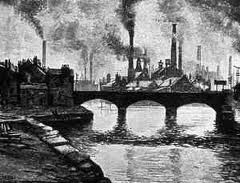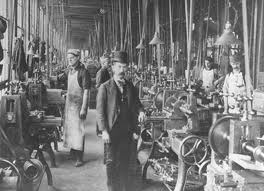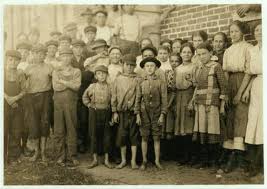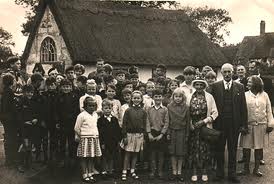The Industrial Revolution in England, towards the end of the eighteenth century and in the early nineteenth century, was marked by rapid increases in production, trade and population. Manufacturing rose to prominence over agriculture as the engine of development.
 A new industrial working class was formed. E. P. Thompson, in his classic book The Making of the English Working Class, describes how this class became class-conscious, giving rise to working class political expressions such as trade unions. This working class was the focus of various forms of political, educational and religious indoctrination aimed at keeping it docile and submissive and hard working.
A new industrial working class was formed. E. P. Thompson, in his classic book The Making of the English Working Class, describes how this class became class-conscious, giving rise to working class political expressions such as trade unions. This working class was the focus of various forms of political, educational and religious indoctrination aimed at keeping it docile and submissive and hard working.
Manufacturers established factories and employed large numbers of workers. Much of the manufacturing centred around textile production. Prior to the factories, the spinning and weaving had been done by hand in people’s own homes. Men did  the weaving, whilst women and children did the spinning. Home workers had worked long hours to make a living, and worked their children too, but the factories took away all control they had over their work and replaced it with the factory discipline dictated by machines, clocks and constant supervision. People were forced to work for 12-14 hours a day in hot airless rooms, often locked in, without water, where they could be fined for opening a window, fined for being dirty, fined for washing themselves during working hours, and even fined for being sick.
the weaving, whilst women and children did the spinning. Home workers had worked long hours to make a living, and worked their children too, but the factories took away all control they had over their work and replaced it with the factory discipline dictated by machines, clocks and constant supervision. People were forced to work for 12-14 hours a day in hot airless rooms, often locked in, without water, where they could be fined for opening a window, fined for being dirty, fined for washing themselves during working hours, and even fined for being sick.
David Dickson identified four reasons that the factories would have been set up in England:
The merchants wanted to control and market the total production of the weavers so as to minimize embezzlement, to maximize the input of work by forcing weavers to work longer hours at greater speeds, to take control of all technical innovation so that it could be applied solely for capital accumulation, and generally to organize production so that the role of the capitalist became indispensable.
It was a time of rapidly growing population and the population was on the move. People were being forced off the land by enclosures and changes in agriculture, they were migrating to England because of starvation in Ireland, and large numbers of men were being released from the army after a long war. People flocked to the towns and provided the workforces for the new factories.
 However these people were not trained as factory workers and had difficulty adapting to the factory discipline. Traditional workers had not been in the habit of working long and regular hours. They would only work when they needed the money. Workers were criticised for being “of loose and wandering habits”.
However these people were not trained as factory workers and had difficulty adapting to the factory discipline. Traditional workers had not been in the habit of working long and regular hours. They would only work when they needed the money. Workers were criticised for being “of loose and wandering habits”.
Discipline was therefore a problem for employers. Andrew Ure described the problem in his 1835 book Philosophy of Manufactures:
To devise and administer a successful code of factory discipline, suited to the necessities of factory diligence, was the Herculean enterprise...it is found nearly impossible to convert persons past the age of puberty, whether drawn from rural or from handicraft occupations, into useful factory hands. After struggling for a while to conquer their listless or restive habits, they either renounce the employment spontaneously, or are dismissed by the overlookers on account of inattention.
Getting skilled workmen to submit to factory discipline was particularly difficult and manufacturers looked for mechanical ways of replacing their labour so that most factory tasks could be reduced “to the exercise of vigilance and dexterity, - faculties.... speedily brought to perfection in the young”.
Women and children could be employed in such work. They were naturally more timid and easier to rule; their slender and more pliant fingers were better adapted to the tasks required of them; their shorter stature made it possible to place them in  corners, and underneath machines where a man neither could nor would consent to be placed.
corners, and underneath machines where a man neither could nor would consent to be placed.
Children as young as four or five years old were employed for 12 hours a day and up to 18 hours a day. Children from the workhouses were locked up during the night to prevent them running away. In 1802 legislation was passed that limited the working hours of children from workhouses to 12 hours per day in the cotton mills. In 1815 another law prohibited the employment of children under ten years of age and limiting those under eighteen to ten and a half hours a day.
Disciplining adults to work hard all day was a more difficult matter. “Industrialization, then, was more than a question of producing goods in a new way. It also entailed a process of socialisation which aimed at stabilizing and inculcating fidelity among those whose labor was being conscripted.”
The ideal solution was a workforce that was motivated to work for work’s sake. Many factory owners, despairing of the traditional lackadaisical attitudes of their workers “launched ‘moral crusades’ and attempted to convert whole sections of their labour force” to Protestantism in the hope of creating “an efficient, diligent, and reliable” workforce.
 For many such factory owners, the new evangelical branches of Protestantism such as Methodism seemed to serve the purpose well. Methodists tended to have ‘methodical’ habits, to pay careful attention to instructions, to fulfil contracts on time, and not be inclined to embezzle materials. They were embued with a work ethic and were generally sober, hard working, obedient employees. The following directive was issued at the Methodist Conference in 1766:
For many such factory owners, the new evangelical branches of Protestantism such as Methodism seemed to serve the purpose well. Methodists tended to have ‘methodical’ habits, to pay careful attention to instructions, to fulfil contracts on time, and not be inclined to embezzle materials. They were embued with a work ethic and were generally sober, hard working, obedient employees. The following directive was issued at the Methodist Conference in 1766:
We must never forget the first rule, ‘Be diligent. Never be unemployed for a moment. Never be triflingly employed. Never while away time; neither spend any more time at any place than is strictly necessary.”
For the workers at the beginning of the industrial revolution, the established church represented little more than the established authorities. Whilst the Protestant ethic had suited the growing middle classes of the sixteenth and seventeenth centuries, and provided a rhetoric to encourage workers, a significant proportion of the new industrial workers could not identify as being one of God’s chosen nor did they see work as a means of social mobility.
Methodism was one of the first branches of Christianity to welcome the industrial workers and offer them salvation. It prompted a religious revival in England. Methodist preaching style was fervent and passionate and attracted thousands of people:
Rather than imitate the fashionable sermonizers by reciting well-prepared addresses of a polished and pedantic character, they improvised their sermons and aimed at generating violent emotions in their listeners, at filling them with the terror of hell, or, more precisely, with dread of sin, which is the true hell.
The aim of this type of sermon was to produce a “crisis of despair” followed by a cathartic release leading to “a mood of blissful peace.” Indeed, people listening to them would faint and have convulsions. Thousands were converted and their popularity led to them being disbarred from preaching in churches so that they preached outside the churches, in the streets, in the market place, in the fields.
The rise in popularity of Methodism amongst both workers and their employers served also to reinforce the work ethic. Rather than teaching predestination whereby only a few were saved and nothing could change that, Methodist preachers believed in “free will and justification by works”. They taught wretched, poorly paid workers that they could look forward to happiness in a future world after death. God’s grace could be attained by everyone, even the lowliest worker. Those who laboured hard, not for money but as an act of virtue, were blessed.
Methodist preachers taught their followers to submit to authority and be obedient: “Even if those in authority are evil or without faith, nevertheless the authority and its power is good and from God...” Elie Halévy, author of England in 1815, noted that Methodist leaders had declared their intention of “promoting loyalty in the middle ranks as well as subordination and industry in the lower orders of society”.
Thompson argued that workers accepted Methodism in part because they were indoctrinated. The Methodist Sunday schools were very active and often the only source of ‘education’ for poor children. These schools were more concerned with teaching good behaviour and submission than teaching reading and writing. In fact, Methodist Sunday schools, like Anglican Sunday schools, discouraged the teaching of writing. Methodists believed children were naturally sinful and education tended to be aimed at their moral rescue. They were not allowed to play freely; their play had to be channelled into useful activities such as chopping wood and digging:
Break their will betimes. Begin this work before they can run alone, before they can speak plain, perhaps before they can speak at all. Whatever pain it costs, break the will if you would not damn the child. Let a child from a year old be taught to fear the rod and to cry softly; from that age make him do as he is bid, if you whip him ten times running to effect it... Break his will now, and his soul shall live, and he will probably bless you to all eternity.
 However not all Methodist preachers and Sunday school teachers were as tough and uncompromising as Methodist doctrine expected and there was enough humanity and sense of community to attract workers and keep them. The chapels ran various activities such as sewing groups, meetings, fund-raising activities, which provided an important opportunity to socialise for people who had been uprooted from their traditional communities and extended families. The chapels helped people feel they were accepted and belonged and were of some worth.
However not all Methodist preachers and Sunday school teachers were as tough and uncompromising as Methodist doctrine expected and there was enough humanity and sense of community to attract workers and keep them. The chapels ran various activities such as sewing groups, meetings, fund-raising activities, which provided an important opportunity to socialise for people who had been uprooted from their traditional communities and extended families. The chapels helped people feel they were accepted and belonged and were of some worth.
Methodism offered opportunities for workers to participate in the running of the Chapel and the Chapel community provided recognition and some status for religious, sober, and pious members. Sinning meant not only a fall from grace but also being expelled from the community.
The repression and discipline expected of everyday life was given an outlet at Chapel where people were encouraged to become emotional and expressive and pour out their feelings. Thompson described:
These Sabbath orgasms of feeling made more possible the single-minded weekday direction of these energies to the consummation of productive labour. Moreover, since salvation was never assured, and temptations lurked on every side, there was a constant inner goading to ‘sober and industrious’ behaviour — the visible sign of grace — every hour of the day and every day of the year. Not only ‘the sack’ but also the flames of hell might be the consequence of indiscipline at work. God was the most vigilant overlooker of them all.
Methodism was a religion that suited employers not only because it furnished an obedient and disciplined work force but also because it emphasised the qualities that they prided themselves on, including thrift, hard work and personal responsibility for success.
Methodism, although taken up by the proprietors of the factories, was particularly popular amongst the poorest and most wretched of workers. “For the miner or weaver, the Chapel with its summons to the emotions, its music and singing, took the place that theatres, picture galleries, operas, occupied in the lives of others.” This limited sense of social well-being together with the promise of a better life afterward enabled the poor downtrodden worker to carry on. And it was more attractive to workers than the Puritan faiths that provided salvation for the limited few who could demonstrate their virtue by counting their money.
Methodism taught patience and resignation and acceptance of the established social order: “poor men were persuaded to practise virtues which enriched their masters rather than brought worldly success to themselves and to seek individual salvation when many of their leaders were urging the need for collective action.” For the workers it taught that the riches and power that were beyond their reach were not everything, that the poor could also be blessed.
However not all workers were Methodists and by 1851 the census showed that only a minority remained religious. Other means were necessary to invoke hard work amongst the working classes. The undesirability of work for most industrial workers made it necessary “for the industrial state to glorify work in order to maximise productivity and profit; so, the work ethic has been preached powerfully.”